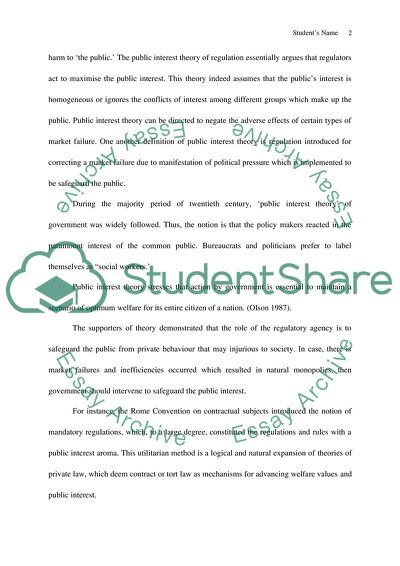Cite this document
(Public Interest Theory v. Economic Interest Theory Coursework, n.d.)
Public Interest Theory v. Economic Interest Theory Coursework. https://studentshare.org/macro-microeconomics/1719360-identification-and-appropriate-usen-of-at-least-2academic-journal-articles-relevant-to-discussion-of-public-interest-theory-economic-interest-theory-using-of-public-interest-theory-of-rugulation-approach-and-economic-interest-group-theory-of-regulation
Public Interest Theory v. Economic Interest Theory Coursework. https://studentshare.org/macro-microeconomics/1719360-identification-and-appropriate-usen-of-at-least-2academic-journal-articles-relevant-to-discussion-of-public-interest-theory-economic-interest-theory-using-of-public-interest-theory-of-rugulation-approach-and-economic-interest-group-theory-of-regulation
(Public Interest Theory V. Economic Interest Theory Coursework)
Public Interest Theory V. Economic Interest Theory Coursework. https://studentshare.org/macro-microeconomics/1719360-identification-and-appropriate-usen-of-at-least-2academic-journal-articles-relevant-to-discussion-of-public-interest-theory-economic-interest-theory-using-of-public-interest-theory-of-rugulation-approach-and-economic-interest-group-theory-of-regulation.
Public Interest Theory V. Economic Interest Theory Coursework. https://studentshare.org/macro-microeconomics/1719360-identification-and-appropriate-usen-of-at-least-2academic-journal-articles-relevant-to-discussion-of-public-interest-theory-economic-interest-theory-using-of-public-interest-theory-of-rugulation-approach-and-economic-interest-group-theory-of-regulation.
“Public Interest Theory V. Economic Interest Theory Coursework”. https://studentshare.org/macro-microeconomics/1719360-identification-and-appropriate-usen-of-at-least-2academic-journal-articles-relevant-to-discussion-of-public-interest-theory-economic-interest-theory-using-of-public-interest-theory-of-rugulation-approach-and-economic-interest-group-theory-of-regulation.


